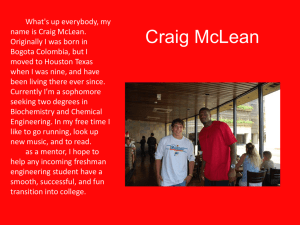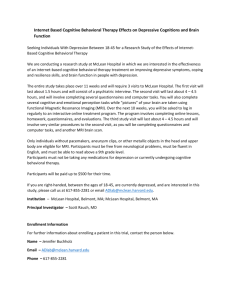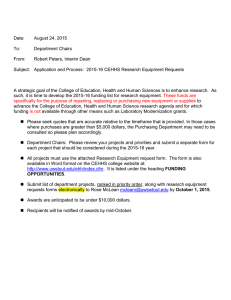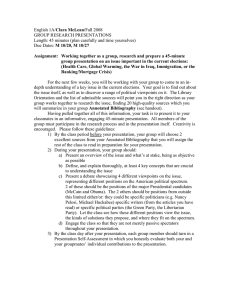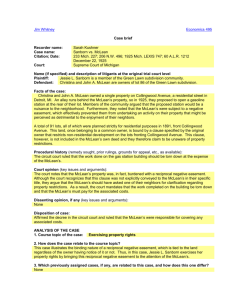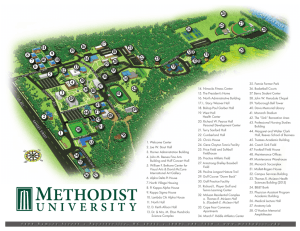The passionate pathologist
advertisement
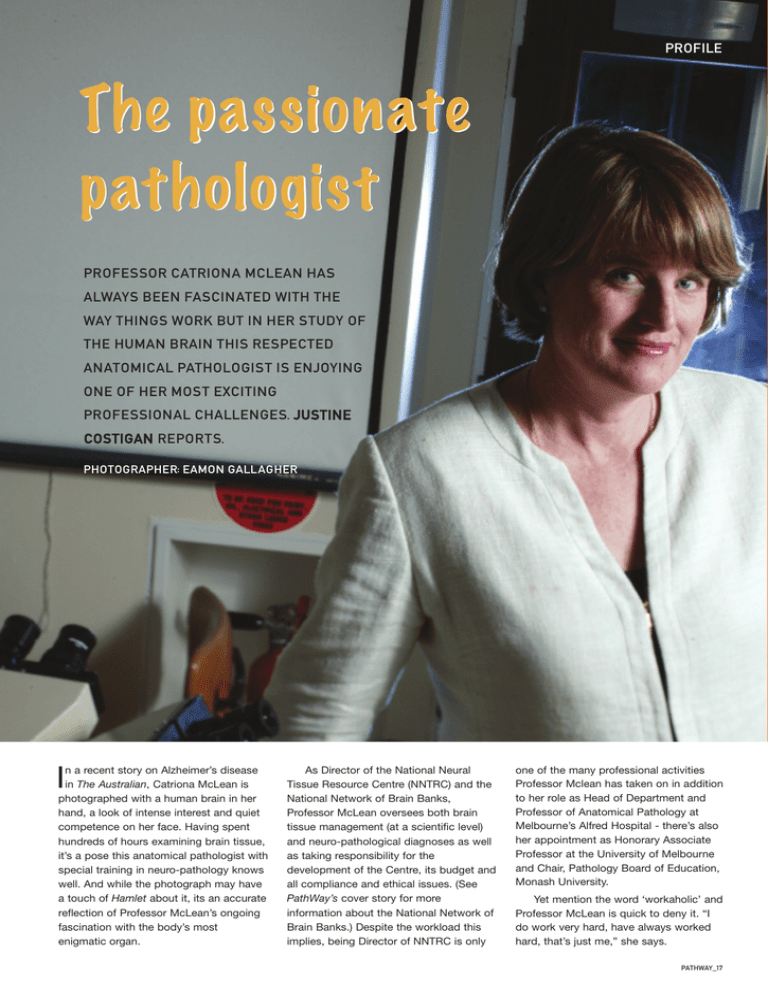
PROFILE The passionate pathologist PROFESSOR CATRIONA MCLEAN HAS ALWAYS BEEN FASCINATED WITH THE WAY THINGS WORK BUT IN HER STUDY OF THE HUMAN BRAIN THIS RESPECTED ANATOMICAL PATHOLOGIST IS ENJOYING ONE OF HER MOST EXCITING PROFESSIONAL CHALLENGES. JUSTINE COSTIGAN REPORTS. PHOTOGRAPHER: EAMON GALLAGHER n a recent story on Alzheimer’s disease in The Australian, Catriona McLean is photographed with a human brain in her hand, a look of intense interest and quiet competence on her face. Having spent hundreds of hours examining brain tissue, it’s a pose this anatomical pathologist with special training in neuro-pathology knows well. And while the photograph may have a touch of Hamlet about it, its an accurate reflection of Professor McLean’s ongoing fascination with the body’s most enigmatic organ. I As Director of the National Neural Tissue Resource Centre (NNTRC) and the National Network of Brain Banks, Professor McLean oversees both brain tissue management (at a scientific level) and neuro-pathological diagnoses as well as taking responsibility for the development of the Centre, its budget and all compliance and ethical issues. (See PathWay’s cover story for more information about the National Network of Brain Banks.) Despite the workload this implies, being Director of NNTRC is only one of the many professional activities Professor Mclean has taken on in addition to her role as Head of Department and Professor of Anatomical Pathology at Melbourne’s Alfred Hospital - there’s also her appointment as Honorary Associate Professor at the University of Melbourne and Chair, Pathology Board of Education, Monash University. Yet mention the word ‘workaholic’ and Professor McLean is quick to deny it. “I do work very hard, have always worked hard, that’s just me,” she says. PATHWAY_17 Using laser micro-dissection, where individual cells are removed and their contents inspected, is an exciting advance for pathologists and will hopefully reveal more about the causes of disease. However, smiles Professor McLean, “there is still a lot to be learnt by looking down the microscope.” Hard work and a love of learning has been a Catriona McLean trait since she was a schoolgirl. Fascinated by the way things worked, and passionate about learning, by the time the young Catriona finished secondary school at 16 she knew that science was her calling. Yet, once she completed a science degree with honours from the University of Melbourne, the 19 year old graduate was not sure what her next step should be. “I knew I wanted to study humans and my uncle, a Professor of Genetics in Edinburgh, suggested a medical degree would be a good foundation for any further study. I was still so young at this stage that the thought of embarking on another degree wasn’t daunting. I just wanted to understand everything – and I still do.” Professor McLean modestly hopes to “solve some problems” but according to her colleagues she is likely to do much more than that. In her early 40s, she is described by Alfred Hospital colleague and Head of Medical Oncology, Max Schwarz, as a “resourceful, innovative and capable leader with immense clinical skills.” Professor Masters describes her fondly as having “unlimited potential” and “a brilliant future.” 18_PATHWAY At university Catriona found that she was drawn to pathology because it was central to understanding disease so when she had to decide upon an area of specialisation, pathology was one of her preferred choices. “I was interested in oncology, neurology and pathology but I wasn’t sure which area to choose. My father was a physician so I knew what it would involve. But I had to ask myself would I be able to do that and have a family?” “The question was an important one because not only did I know I wanted to have a family, I was actually pregnant at the time, so the decision had some urgency. It seemed to me that being on call would not be a good thing if you had small children and because I had always been interested in pathology it was an easy decision to make. I have never regretted it.” Having children was also the catalyst that led Professor McLean to her interest in the brain, albeit indirectly. Between her second son and the arrival of twin boys, Professor McLean realised that having a full-time job and small children was becoming too complicated so she decided to temporarily give up full time work to focus on a post-doctoral degree instead. Working with the University of Melbourne’s Professor Colin Masters – a world leader in research into Alzheimer's disease and viral infections of the brain – Professor McLean’s interest in neuropathology was nurtured and developed. Professor McLean’s work on Alzheimer’s disease is now one of several areas of interest in the brain. Current research projects include an analysis of "plaque busting" drugs in human Alzheimer disease tissue; an analysis of genetic factors in motor neuron disease that may help understand the cause of degeneration of the neurons; and studies that will lead to an understanding of brain viral reservoirs in patients with HIV. “It’s an enigma,” she says. “The brain is so challenging from an anatomical pathology point of view. There are so many fascinating diseases we don’t understand and it is all so complex.” Using laser micro-dissection, where individual cells are removed and their contents inspected, is an exciting advance for pathologists and will hopefully reveal more about the causes of disease. However, smiles Professor McLean, “there is still a lot to be learnt by looking down the microscope.” Professor McLean modestly hopes to “solve some problems” but according to her colleagues she is likely to do much more than that. In her early 40s, she is described by Alfred Hospital colleague and Head of Medical Oncology, Max Schwarz, as a “resourceful, innovative and capable leader with immense clinical skills.” Professor Masters describes her fondly as having “unlimited potential” and “a brilliant future.” Yet Professor Mclean herself has no grand plan. “I don’t know where I’m going to be in 15 years. Things develop and interests evolve. I have a five year appointment as a Professor and if I can pass on my love of pathology and inspire my students to continue I will be happy.”
